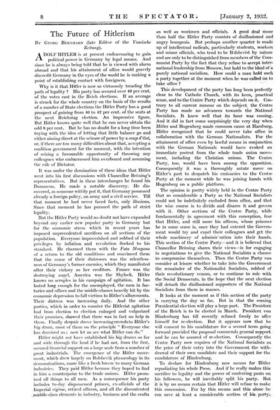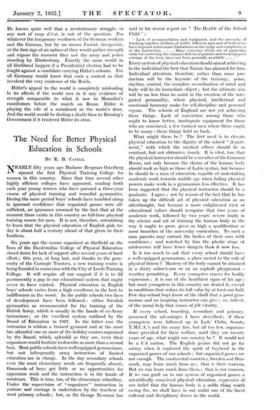The Future of Hitlerism
BY GEORG BERNHARD (late Editor of the Vossische
Zeitung).
ADOLE HITLER is at present endeavouring to gain political power in Germany by legal means. And since he is always being told that he is viewed with alarm abroad and that his attainment of office would gravely discredit Germany in the eyes of the world he is making a point of establishing contact with foreigners.
Why is it that Hitler is now so virtuously treading the
path of legality ? party has secured over 40 per cent. of the votes cast in the Reich elections. If an average is struck for the whole country on the basis of the results of a number of State elections the Hitler Party has a good prospect of gaining from 40 to 42 per cent. of the seats at the next Reichstag election. An impressive figure. But Hitler knows quite well that he can never obtain the odd 8 per cent. But he has no doubt for a long time been toying with the idea of letting that little balance go and either aiming direct at the seizure of power by a coup d'etat, or, if there are too many difficulties about that, accepting a coalition government for the moment, with the intention of seizing a favourable opportunity of throwing any colleagues who embarrassed him overboard and assuming the role of Dictator.
It was under the domination of these ideas that Hitler went into his first discussions with Chancellor Briining's representatives. But in these interchanges he found his Damascus. He made a notable discovery. He dis- covered, as someone wittily put it, that Germany possessed already a foreign policy, an army and a civil service. Till that moment he had never faced facts, only illusions. Since that moment he has pursued the path of strict legality.
But the Hitler Party would no doubt not have expanded beyond any earlier new popular party in Germany but for the economic stress which in recent years has imposed unprecedented sacrifices on all sections of the population. Everyone impoverished and robbed of their privileges by inflation and revolution flocked to his standard. He charmed them with the Rita Morgan of a return to the old conditions and convinced them that the cause of their distresses was the relentless- ness of Germany's former enemies, which they manifested after their victory as her creditors. France was the destroying angel, America was the Shylock. Hitler knows no scruples in his campaign of agitation. It has lasted long enough for the unemployed, the men in fac- tories and 'offices and the middle-classes heavily hit by the economic depression to fall victims to Hitler's allurements. Their distress was increasing daily. And the other parties, which in order to counter the Hitlerist agitation had from election to election enlarged and vulgarized their promises, showed that there was in faCt. no help in them. Finally despair drove increasing crowds to Hitler's big drum, most of them on the principle " Everyone else has deceived us ; now let us see what Hitler can do." Hitler might not have established his big drums so far and wide through the land if he had not, from the first, secured financial support on a large scale from a number of great industrials. The emergence of the Hitler move- ment, which drew largely on Bolshevik phraseology in its demonstrations, came like a fresh breeze to many German industries. They paid Hitler because they hoped to find in him a counterpoise to the trade unions. Hitler prom- ised all things to all men. As a consequence his party includes to-day dispossessed princes, ex-officials of the Imperial regime, retired officers, and all the discontented ;piddle-class elements in industry, business and the crafts
as well as workmen and officials. A good deal More than half the Hitler Party consists of disillusioned and angry bourgeois. But perhaps another quartei is made up of intellectual radicals, particularly students, workers and minor officials, who tend to be Bolshevist by nature and are only to be distinguished from members of the Com- munist Party by the fact that they refuse to accept intel'- national leadership from Moscow, but hold to the ideal of purely national socialism. How could a man hold such a party together at the moment when he rues called ori to take office P
This development of the party has long been perfectly clear to the Catholic Church, with its keen, practical sense, and to the Centre Party which depends on it Con- trary to all current rumour on the subject, the Centre Party has made no advances towards the National Socialists. It knew well that its hour was coming. And it did in fact come surprisingly the very day when Hitler and Hugenberg made common cause at Harzburg. Hitler recognized that he could never take office in collaboration with the German Nationalists. For the attainment of office even by lawful means in conjunction with the German Nationals would have evoked an immediate protest from the whole trade union move- ment, including the Christian unions. The Centre Party, too, would have been among the opposition. Consequently it was a thoroughly astute ' move on Hitler's part to despatch his emissaries to the Centre Party at the moment while he was joining hands with Hugenberg on a public platform.
The opinion is pretty widely held in the Centre Party that so considerable a Party as the National Socialists could not be indefinitely excluded from office, and that the wise course is to divide and disarm it and govern with it. Other sections of the Centre Party, while fundamentally in agreement with this conception, fear that Hitler, and still more his officers, whose prisoner he in some sense is, once they had entered the Govern- ment would try and expel their colleagues and get the whole machinery of adminis' ration into their hands. This section of the Centre Party—and it is believed that Chancellor Bruning shares their views—is for engaging in negotiations to give the National Socialists a chance to compromise themselves. Then the Centre Party can consider at leisure whether to take into the Government the remainder of the Nationalist Socialists, robbed of their revolutionary venom, or to continue to rule with the Social Democrats, in the hope that the next election will detach the disillusioned supporters of the National Socialists from them in masses.
It looks at the moment as if this section of the party is carrying the day so far. But in that the coming Presidential election will play a large part. The President of the Reich is to be elected in March. President von Hindenburg has till recently refused firmly to offer himself for re-election. But it appears now that lie will consent to his candidature for a second term, going forward provided the proposal commends general support and he can be assured of re-election. Consequently. the Centre Party now requires of the National Socialists as the price of their entry into the Government the. with drawal of their own candidate and their support for the candidature of Hindenburg.
To declare for Hindenburg now means for Hitler repudiating his whole Press. And if he really makes this sacrifice to legality and the power of conferring posts on his followers, he will inevitably split his party. -But it is by no means certain that Hitler will refuse to make this concession. For by this means and this alone :he can save at least a considerable section of his. patty. He.knows quite well that a revolutionary struggle, or any sort of .coup d'e:ut, is out of the question. For whateverthe.temporary weakness of the German workers and the German, but by no means Fascist, bourgeoisie, at the first sign of an upheaval they would gather strength and vigour the moment they saw the army and police standing.-by Hindenburg. Exactly the same would in all likelihood happen if a Presidential election had to be fought against a candidate carrying Hitler's colours. For all .Germany. would know that such a contest as that involved the very existence of the Reich.
Hitler's appeal to the world is completely misleading in its effects if the world sees in it any evidence of strength comparable to what it saw in Mussolini's manifestoes before the march on Rome. Hitler is playing the role of a mendicant at the world's door. And the world would he dealing a death blow to Briining's Government if it tendered Hitler its alms.







































 Previous page
Previous page